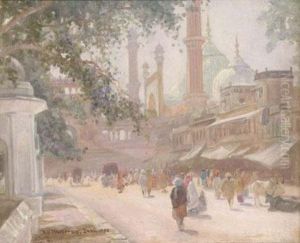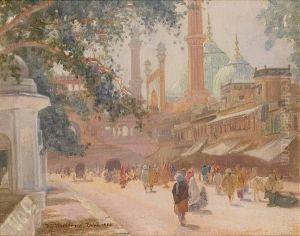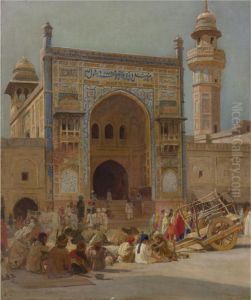Roderick D. Mackenzie Paintings
Roderick Dempster Mackenzie was a Scottish-American painter born on August 1, 1865, in Banffshire, Scotland. He began his artistic training at the early age of twelve when he became an apprentice to a decorative painter in Aberdeen. His talent and drive were evident, and he eventually moved to Edinburgh, where he attended the Royal Scottish Academy. Mackenzie's dedication to his craft led him to further his studies in Paris at the Académie Julian, where he was influenced by the academic style and the vibrant art scene of the late 19th century.
Mackenzie's early work was marked by his interest in historical subjects and his ability to capture the grandeur of the past. His talent did not go unnoticed, and he received several awards and scholarships that allowed him to travel extensively. He visited countries such as Egypt and India, where he was commissioned to document the Durbar, a ceremonial gathering to mark the coronation of King Edward VII as Emperor of India in 1903. This experience had a profound impact on Mackenzie, and he created a series of paintings that showcased his ability to depict large-scale, complex scenes with a multitude of figures.
In 1888, Mackenzie emigrated to the United States and settled in Mobile, Alabama. His work during this period often reflected the landscapes and historical themes of his adopted country. Notable among his works from this time is the 'Battle of Mobile Bay' series, which is considered one of his most significant contributions to American art. Mackenzie was not only a painter but also a teacher and an active member of the art community in Mobile. He helped establish the Mobile Art Association and was involved in the creation of the city's first art museum.
Mackenzie's art was characterized by a realistic style, attention to detail, and a rich use of color. He was interested in capturing moments of historical significance and the everyday life of people from different cultures. His travels and experiences provided him with a vast array of subjects and themes, which he skillfully translated onto canvas.
Roderick D. Mackenzie's legacy includes his contributions to the cultural life of Mobile, Alabama, as well as the body of work he left behind, which offers a glimpse into the historical and cultural moments of his time. He passed away on July 21, 1941, in Mobile, leaving behind a legacy as a chronicler of history and an influential figure in the American art scene of the late 19th and early 20th centuries.







